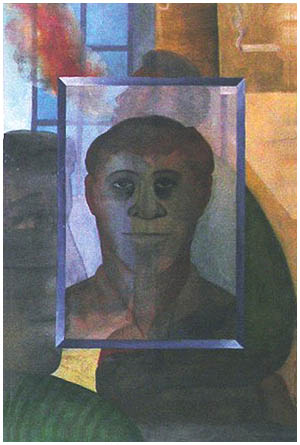Nikhileswar Baruah remembers his childhood
days in Guwhati quite clearly. The picturesque state,
now ripped apart by violence, in fact finds its way
in his works quite often.
He comes from a family with a background in theatre.
"But I liked painting right since childhood,"
he recalls. "And no one in my family tried to divert
my attention to any other art form. I knew I would be
a painter."
After completely his 12th standard, Baruah joined the
M.S. University Baroda to do his Bachelors and then
Masters in fine arts. In 1992, he took up a job as a
lecturer in the University's painting department, which
he quit only recently.
Baruah mostly works with watercolors on paper, a medium
he says, "which is very flexible and allows you
to experiment." His works reflect the agony and
trauma of every sensible, secular Indian who is appalled
by the violence and strife that's torn India apart.
Hailing from Assam, the artist himself has seen the
effect of this violence and strife. "I have lived
through it in my younger days," he simply states,
"so I know the effect it has on people." His
works over the last few years have all concentrated
on modern man's apathy to the growing violence.
The repetition of events and history is a recurring
theme in Baruah's works. Last year, disturbed by the
plunging India Pakistan relationship and the specter
of an insecure subcontinent facing the threat of a nuclear
war, the artist painted around this theme.
Baruah held his first exhibition in Mumbai in 1995.
In 1997, he followed it up with a solo show at Prithvi
and then in, 2001 at Lakeeren. Besides that, he has
shown extensively in group shows at Baroda.
He was honored with the Artist of the Year award at
the Harmony show in 2000, besides which he won the Unesco
scholarship to for the European Ceramic Work Centre,
Netherlands.
Nikhileshwar Baruah lives and works out of Baroda.

back |



